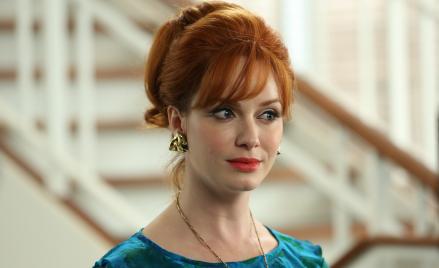Seth, Paul:
We are all prostitutes now, or so Matt Weiner seems to be saying in an episode with as many variations on the sex-for-money theme as you could comfortably fit into an hour. The episode opens with Timmy, the Heinz Ketchup sleazeball, surreptitiously meeting Don and Pete in Campbell’s Love Nest, then twisting off his gold wedding ring for a night out. It ends with Don finding a shiny penny under the doormat. In between we have the humiliation of Joan by Harry, who barges into a partner’s meeting to say that he doesn’t get to be a partner because “my accomplishments happened in broad daylight.” And finally, in the heartbreaker plot of the episode, Don, who comes to watch Megan on her soap opera set do her first ever love scene, yells at her in the dressing room, “You kiss people for money!”
The broader theme (and it’s a little Phyllis Schlafly for my tastes) is that free love isn’t really free. If you dive into the late 1960s sex scene, then you either come out with a huge hangover (like Joan’s friend Kate) or you’re a total lascivious buffoon (like Megan’s swinger bosses). In the meantime, Don’s brand of adultery is so old-timey it’s biblical, freighted with crucifixes and prayer and long meaningful looks. In fact Don is the peeping Tom of the episode, spying on Peggy, spying on Megan, a spectator to the action going on around him but not really able to participate. The only person who is truly living the Age of Aquarius in this episode is that dude in the white pants at the Electric Circus (a real place, apparently!) who gets to hop over the back of the couch and make out with Joan, just like that, for the price of one cheap but effective pickup line (“He said I’d want you”).
Joan’s position on that couch—there but somewhat stiff and reluctant—pretty much encapsulates her relationship to the changing times. Her mother is proud of her, and her friend Kate is deeply jealous. “I want what you have,” Kate confesses. “It’s so damned impressive; I don’t care how they make you feel! It’s right in front of you, for the taking.” But Joan doesn’t feel triumphant. She feels like 15 years later, they still treat her like a secretary. And from what we see in the office, it’s even worse than that. At least when she was secretary she had an obvious line of authority. Now, it’s never clear what she does all day, and she doesn’t have the power even to fire Harry’s secretary when she lies.
But still, just by holding the title of “executive” Joan has an important identity, even if she doesn’t own it yet. This is the somewhat unofficial feminist history as described, for example, in Gail Collins’ When Everything Changed, a story of ordinary and often reluctant women, stewardesses or office workers or sometimes housewives who found themselves, for one reason or another, held up as an example of courage by their friends. This is why the pairing of Joan and Dawn makes sense—they are kindred spirits, gritting their teeth and fighting some kind of fight, even if they don’t exactly understand what it is they are fighting for. (Paul, you called for the show to flesh out some of its non-white characters. Did this Dawn subplot make inroads on that front?)
Peggy, on the other hand, has none of that reluctance. She was up there selling out her old friend, her old boss, and her art for the sake of sleazy Timmy. This is “prostitution” as a workplace metaphor, saying and doing whatever it takes to please the client. Her Heinz ad “The Only Ketchup” wasn’t bad, but it was exactly what they would want. She started out with a little theater, pretending as if she, too, was enraged that catsup would pass off their watered-down flavorless sauce as ketchup, and then showed them an ad with a big picture of the product. No abstraction, no creativity, just making the client happy and delivering the goods. But though Peggy’s the perfect one-afternoon stand in that hotel room, she isn’t the wife—Ketchup chooses J. Walter Thompson instead.
It struck me that by acting, Peggy allows herself to feel a little less, which is precisely what Megan does in her love scene. That play within a play unfolded beautifully. The first shot showed Megan dressed up in her maid’s uniform lounging on a couch, and because we’d never seen her on set, it wasn’t clear if this was “Zou Bisou Bisou,” Downstairs edition, or what exactly was going on. Then pretty soon Megan (as the maid) was on her back on the bed, with “Rafe” all over her. Her acting dilemma is a real one for the era. I recently saw the movie Hitchcock, which is about the making of Psycho. It takes place a few years earlier than this episode, but one of its main themes is Hitchcock’s rage about his leading ladies always betraying him because their husbands insisted they quit, or lay off on the love scenes, or button up their shirts. That doesn’t excuse Don’s despicable behavior, of course. But it does create the interesting dynamic that Megan, the youngest of all the adults and the best placed to let loose in the late ‘60s, is practically the only character on this show whose moral compass seems to point true north.
Boys, eager to hear what you have to say on Don’s all-too-brief buzz, Joe Namath in a straw hat, or Stan’s fabulous fringe suede jacket. And remember …
Dow Chemicals: Responsible for making people smile.
Hanna
